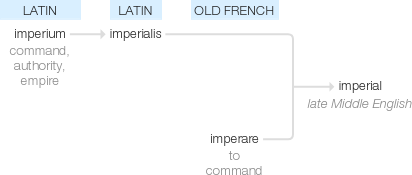Imperial
late Middle English: via Old French from Latin imperialis, from imperium ‘command, authority, empire’; related to imperare ‘to command’. Compare with emperor, empire, also with imperious.
wiktionary
From Middle English imperial, from Old French imperial, from Latin imperiālis(“of the empire or emperor, imperial”), from imperium(“empire, imperial government”) + -ālis, from imperō(“command, order”), from im-(“form of in”) + parō(“prepare, arrange; intend”).
etymonline
imperial (adj.)
late 14c., "having a commanding quality," from Old French imperial, emperial "imperial; princely, splendid; strong, powerful" (12c.), from Latin imperialis "of the empire or emperor," from imperium "empire" (see empire).
Meaning "pertaining to an empire" (especially Rome's) is from late 14c.; by 1774 of Britain's. Meaning "of imposing size or excellence" is from 1731. Imperial presidency in a U.S. context traces to Arthur Schlesinger Jr.'s book on the Nixon administration (1974). Related: Imperially. The noun is from 1520s as "member of the emperor's party;" 1670s as the name of gold coins issued by various imperial authorities.
